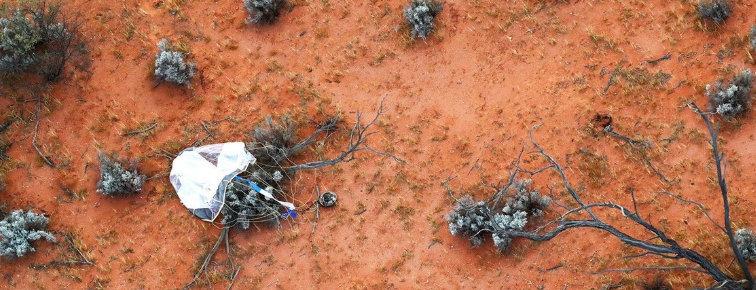Brief introduction: After more than 6 years of journey, the Hayabusa asteroid probe launched by Japan returned to Earth with a rock sample from asteroid Ryugu, and the return capsule crashed into the desert area of Australia, which was searched and recovered by the Japanese team.

The Japanese team searched for small space capsules landing in Australia's desert belt on Sunday.
The capsule landed separately from the Hayabusa-2 probe. Japan's Hayabusa probe, which mainly marks and collects samples from the asteroid Ryugu, has been in space for nearly six years.
During this voyage, Hayabusa2 collected some very rare substances. For now, humans have only been exposed to this substance once.
Hayabusa2 takes pictures. Image source: 360 search
Throughout astronomical history, Ryugu is the second asteroid that humans can study on the material inside. Samples from the capsule have been shipped to the laboratory. The study of the sample will take us on a new journey – the scientific understanding of space rocks will change; at the same time, we will gain more knowledge about the solar system.
When the asteroid probe landed at Ryugu on February 21, 2019, the Hayabusa2 probe ended its five-year voyage. (Hayabusa2 arrived in Ryugu's orbit in June 2018, and before its final landing, it orbited Ryugu for a year to observe and collect images of Ryugu.) )
Ryugu and Hayabusa2 landing sites. Image source: 360 search
Before returning home, the spacecraft collected a small sample on the surface rocks of the Dragon Palace. On its return to Earth, the 40-centimeter-long capsule broke away from Hayabusa2 and landed on Friday night. The capsule landed in the Woomera Exclusion Zone in southern Australia (interestingly, this is not really a restricted zone, and only requires a tourist permit to enter. This is an area used by the Royal Australian Air Force for military and civilian research.
Wumera Forbidden Zone
How did they find it —
A search team entered the Australian interior to search for the capsule by tracking the radio waves emitted by the radio beacons on the capsule.
The Japan Aerospace Development Agency (JAXA) has installed five antenna devices in the expected landing area, capable of receiving wireless signals in an area of 38 square miles (1 mile is about 1609 meters). At the same time, a helicopter equipped with a beacon receiver flew overhead.
This is the second asteroid sampling mission in Japan. As early as June 13, 2010, the Hayabusa probe arrived at asteroid Itokawa 25143 and brought back samples.
Hayabusa probe,
Why do we study asteroids —
The material that forms the asteroid is exactly the same as the material that makes up the solar system; and the asteroid may well contain clues that may reveal how water and other biological matter on Earth formed and how life shines.
Much of what we know about asteroids at this stage comes from meteorites. Meteorites scatter to Earth with comets and asteroids that pass by, but can change significantly due to Earth's atmosphere, moisture, or weather. Thus, obtaining a piece of asteroid debris in space is equivalent to providing scientists with primordial material from the early days of the solar system billions of years ago.
Another reason is related to the potential threat of asteroids to Earth.
"Ryugu" orbit. Image source: 360
Ryugu is a potentially dangerous near-Earth planet with a diameter of about 0.6 miles. Ryugu takes 16 months to orbit the Sun, and its elliptical orbit happens to pass through the orbits of Earth and Mars.
Ryugu is a potentially dangerous asteroid with little chance of colliding with Earth. NASA
The space agency keeps a close eye on the asteroid's trajectory, fearing that one of them will leave its original orbit and fly to Earth.
What's next —
Hayabusa2 delivered the sample-laden capsule over Earth and sailed to the next station, an asteroid named 1998KY26. Hayabusa2 will explore the spherical asteroid in 2031, making observations without landing.
Meanwhile, NASA's OSIRIS-REx probe obtained a sample aboard the asteroid Bennu in October. The two space agencies will also exchange space rock fragments obtained by each other, and NASA will receive a portion of the sample rock fragments obtained from the "Dragon Palace" by the Japan Aerospace Development Agency (JAXA) and will share their samples after Bennu returns to Earth in March 2021.
The U.S. probe OSIRIS-Rex entered orbit around the asteroid Bennu
BY: inverse
FY: Immortals are chubby
If there is any infringement of the relevant content, please contact the author to delete it after the work is published
Please also obtain authorization to reprint, and pay attention to maintaining completeness and indicating source